Deck 6: Integration
Question
Question
Question
Question
Question
Question
Question
Question
Question
Question
Question
Question
Question
Question
Question
Question
Question
Question
Question
Question
Question
Question
Question
Question
Question
Question
Question
Question
Question
Question
Question
Question
Question
Question
Question
Question
Question
Question
Question
Question
Question
Question
Question
Question
Question
Question
Question
Question
Question
Question
Question
Question
Question
Question
Question
Question
Question
Question
Question
Question
Question
Question
Question
Question
Question
Question
Question
Question
Question
Question
Question
Question
Question
Question
Question
Question
Question
Question
Question
Question

Unlock Deck
Sign up to unlock the cards in this deck!
Unlock Deck
Unlock Deck
1/291
Play
Full screen (f)
Deck 6: Integration
1
Estimate the present value of an annuity if payments are $1,500 monthly for 15 years and the account earns interest at the rate of 10% per year compounded continuously. Round your answer to the nearest dollar.
A) $124,516
B) $124,708
C) $131,206
D) $126,483
E) $139,837
A) $124,516
B) $124,708
C) $131,206
D) $126,483
E) $139,837
$139,837
2
In a study conducted by a certain country's Economic Development Board, it was found that the Lorentz curve for the distribution of income of college teachers was described by the function 
And that of lawyers by the function

Compute the coefficient of inequality for each Lorentz curve. Round your answer to four decimal places.
Which profession has a more equitable income distribution?
A)
B) 
C) 
D) 

And that of lawyers by the function

Compute the coefficient of inequality for each Lorentz curve. Round your answer to four decimal places.
Which profession has a more equitable income distribution?
A)

B)

C)

D)



3
The demand function for a certain make of replacement cartridges for a water purifier is given by

Where p is the unit price in dollars and x is the quantity demanded each week, measured in units of a thousand. Determine the consumers' surplus if the market price is set at $1/cartridge. Round your answer to the nearest dollar.
A) $22,006
B) $21,526
C) $21,445
D) $21,667
$21,667
4
Sinclair wishes to supplement his retirement income by $250 per month for the next 12 years. He plans to obtain a reverse annuity mortgage (RAM) on his home to meet this need. Estimate the amount of the mortgage he will require if the prevailing interest rate is 11% per year compounded continuously.
A) $34,403
B) $19,987
C) $29,713
D) $34,790
E) $15,104
A) $34,403
B) $19,987
C) $29,713
D) $34,790
E) $15,104

Unlock Deck
Unlock for access to all 291 flashcards in this deck.
Unlock Deck
k this deck
5
Find the amount of an annuity if $200 per month is paid into it for a period of 17 years, earning interest at the rate of 7% per year compounded continuously. Round you answer to the nearest dollar.
A) $284,751
B) $130,510
C) $78,414
D) $84,009
E) $144,734
A) $284,751
B) $130,510
C) $78,414
D) $84,009
E) $144,734

Unlock Deck
Unlock for access to all 291 flashcards in this deck.
Unlock Deck
k this deck
6
Aiso deposits $130/month in a savings account paying 5% /year compounded continuously. Estimate the amount that will be in his account after 5 years. Round your answer to the nearest dollar.
A) $8,862
B) $10,096
C) $4,541
D) $11,005
A) $8,862
B) $10,096
C) $4,541
D) $11,005

Unlock Deck
Unlock for access to all 291 flashcards in this deck.
Unlock Deck
k this deck
7
Estimate the present value of an annuity if payments are $700 monthly for 14 years and the account earns interest at the rate of 4% /year compounded continuously. Round your answer to the nearest dollar.
A) $85,725
B) $90,046
C) $91,280
D) $92,189
A) $85,725
B) $90,046
C) $91,280
D) $92,189

Unlock Deck
Unlock for access to all 291 flashcards in this deck.
Unlock Deck
k this deck
8
The demand function for a certain brand of compact disc is given by 
The supply function for the compact discs of is given by

Where p is the wholesale unit price in dollars and x is the quantity demanded each week, measured in units of a thousand. Determine the producers' surplus if the wholesale market price is set at the equilibrium price. Round your answer to the nearest dollar.
A) $16,907
B) $16,338
C) $16,667
D) $16,805

The supply function for the compact discs of is given by

Where p is the wholesale unit price in dollars and x is the quantity demanded each week, measured in units of a thousand. Determine the producers' surplus if the wholesale market price is set at the equilibrium price. Round your answer to the nearest dollar.
A) $16,907
B) $16,338
C) $16,667
D) $16,805

Unlock Deck
Unlock for access to all 291 flashcards in this deck.
Unlock Deck
k this deck
9
The Armstrongs wish to establish a custodial account to finance their children's education. If they deposit $100 monthly for 10 years in a savings account paying 6% /year compounded continuously, how much will their savings account be worth at the end of this period? Round your answer to the nearest dollar.
A) $12,100
B) $17,654
C) $18,567
D) $16,442
A) $12,100
B) $17,654
C) $18,567
D) $16,442

Unlock Deck
Unlock for access to all 291 flashcards in this deck.
Unlock Deck
k this deck
10
Suppose an investment is expected to generate income at the rate of 
Dollars/year for the next 6 years. Find the present value of this investment if the prevailing interest rate is 4% /year compounded continuously. Round your answer to the nearest dollar.
A) $1,601,531
B) $1,595,954
C) $1,600,291
D) $1,602,431

Dollars/year for the next 6 years. Find the present value of this investment if the prevailing interest rate is 4% /year compounded continuously. Round your answer to the nearest dollar.
A) $1,601,531
B) $1,595,954
C) $1,600,291
D) $1,602,431

Unlock Deck
Unlock for access to all 291 flashcards in this deck.
Unlock Deck
k this deck
11
The demand function for a certain brand of compact disc is given by

Where p is the wholesale unit price in dollars and x is the quantity demanded each week, measured in units of a thousand. Determine the consumers' surplus if the wholesale market price is set at $1/disc. Round your answer to the nearest dollar.
A) $26,988
B) $26,667
C) $26,454
D) $26,544

Unlock Deck
Unlock for access to all 291 flashcards in this deck.
Unlock Deck
k this deck
12
A certain country's income distribution is described by the function 
Compute and
and  .
.
A)
B) 
C) 
D) 
E) 

Compute
 and
and  .
.
A)

B)

C)

D)

E)


Unlock Deck
Unlock for access to all 291 flashcards in this deck.
Unlock Deck
k this deck
13
A state lottery commission pays the winner of the "Million Dollar" lottery 20 annual installments of $30,000 each. If the prevailing interest rate is 8% /year compounded continuously, find the present value of the winning ticket. Round your answer to the nearest dollar.
A) $301,432
B) $294,968
C) $299,289
D) $300,523
A) $301,432
B) $294,968
C) $299,289
D) $300,523

Unlock Deck
Unlock for access to all 291 flashcards in this deck.
Unlock Deck
k this deck
14
A firm purchased a 15-year franchise for a computer outlet store that is expected to generate income at the rate of 
Dollars per year. If the prevailing interest rate is 9% per year compounded continuously, find the present value of the franchise.
A) $3,264,095
B) $4,938,398
C) $3,619,817
D) $2,240,764
E) $5,973,418

Dollars per year. If the prevailing interest rate is 9% per year compounded continuously, find the present value of the franchise.
A) $3,264,095
B) $4,938,398
C) $3,619,817
D) $2,240,764
E) $5,973,418

Unlock Deck
Unlock for access to all 291 flashcards in this deck.
Unlock Deck
k this deck
15
It is known that the quantity demanded of a certain make of portable hair dryer is x hundred units/week and the corresponding wholesale unit price is

Dollars. Determine the consumers' surplus if the wholesale market price is set at $20/unit. Round your answer to the nearest dollar.
A) $3,114
B) $3,438
C) $3,656
D) $3,579

Unlock Deck
Unlock for access to all 291 flashcards in this deck.
Unlock Deck
k this deck
16
A certain country's income distribution is described by the function 
Sketch the Lorentz curve for this function.
Compute and interpret your results.
and interpret your results.
A)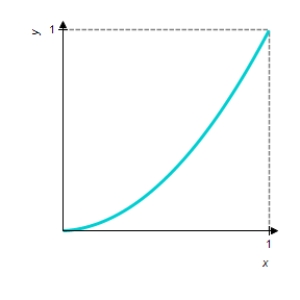
 The lowest 60 percent of the people receive 37.3 percent of the total income. The lowest 80 percent of the people receive 64.9 percent of the total income.
The lowest 60 percent of the people receive 37.3 percent of the total income. The lowest 80 percent of the people receive 64.9 percent of the total income.
B)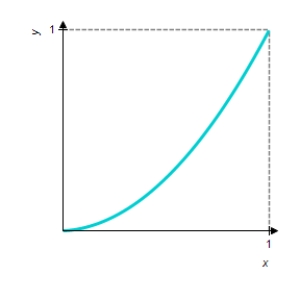
 The lowest 80 percent of the people receive 37.3 percent of the total income. The lowest 60 percent of the people receive 64.9 percent of the total income.
The lowest 80 percent of the people receive 37.3 percent of the total income. The lowest 60 percent of the people receive 64.9 percent of the total income.
C)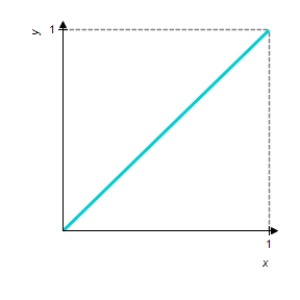
 The lowest 60 percent of the people receive 37.3 percent of the total income. The lowest 80 percent of the people receive 64.9 percent of the total income.
The lowest 60 percent of the people receive 37.3 percent of the total income. The lowest 80 percent of the people receive 64.9 percent of the total income.

Sketch the Lorentz curve for this function.
Compute
 and interpret your results.
and interpret your results.
A)

 The lowest 60 percent of the people receive 37.3 percent of the total income. The lowest 80 percent of the people receive 64.9 percent of the total income.
The lowest 60 percent of the people receive 37.3 percent of the total income. The lowest 80 percent of the people receive 64.9 percent of the total income. B)

 The lowest 80 percent of the people receive 37.3 percent of the total income. The lowest 60 percent of the people receive 64.9 percent of the total income.
The lowest 80 percent of the people receive 37.3 percent of the total income. The lowest 60 percent of the people receive 64.9 percent of the total income. C)

 The lowest 60 percent of the people receive 37.3 percent of the total income. The lowest 80 percent of the people receive 64.9 percent of the total income.
The lowest 60 percent of the people receive 37.3 percent of the total income. The lowest 80 percent of the people receive 64.9 percent of the total income. 
Unlock Deck
Unlock for access to all 291 flashcards in this deck.
Unlock Deck
k this deck
17
Find  . Round your answer to the nearest integer.
. Round your answer to the nearest integer.
A) 1,406,645
B) 1,409,534
C) 1,467,002
D) 1,421,879
 . Round your answer to the nearest integer.
. Round your answer to the nearest integer. A) 1,406,645
B) 1,409,534
C) 1,467,002
D) 1,421,879

Unlock Deck
Unlock for access to all 291 flashcards in this deck.
Unlock Deck
k this deck
18
The management of the Titan Tire Company has determined that the quantity demanded x of their Super Titan tires/week is related to the unit price p by the relation 
Where p is measured in dollars and x is measured in units of a thousand. Titan will make x units of the tires available in the market if the unit price is

Dollars. Determine the consumers' surplus and the producers' surplus when the market unit price is set at the equilibrium price. Round your answers to the nearest dollar.
A) CS = $337,012 , PS = $166,346
B) CS = $342,567 , PS = $171,901
C) CS = $343,476 , PS = $172,810
D) CS = $341,333 , PS = $170,667

Where p is measured in dollars and x is measured in units of a thousand. Titan will make x units of the tires available in the market if the unit price is

Dollars. Determine the consumers' surplus and the producers' surplus when the market unit price is set at the equilibrium price. Round your answers to the nearest dollar.
A) CS = $337,012 , PS = $166,346
B) CS = $342,567 , PS = $171,901
C) CS = $343,476 , PS = $172,810
D) CS = $341,333 , PS = $170,667

Unlock Deck
Unlock for access to all 291 flashcards in this deck.
Unlock Deck
k this deck
19
The quantity demanded x (in units of a hundred) of the miniature cameras per week is related to the unit price p (in dollars) by

And the quantity x (in units of a hundred) that the supplier is willing to make available in the market is related to the unit price p (in dollars) by

If the market price is set at the equilibrium price, find the consumers' surplus and the producers' surplus. Please round the answers to the nearest dollar.
A) The consumers' surplus: $22,075, the producers' surplus: $26,872
B) The consumers' surplus: $6,667, the producers' surplus: $11,667
C) The consumers' surplus: $22,161, the producers' surplus: $39,729
D) The consumers' surplus: $11,667, the producers' surplus: $6,667
E) The consumers' surplus: $39,729, the producers' surplus: $22,161

And the quantity x (in units of a hundred) that the supplier is willing to make available in the market is related to the unit price p (in dollars) by

If the market price is set at the equilibrium price, find the consumers' surplus and the producers' surplus. Please round the answers to the nearest dollar.
A) The consumers' surplus: $22,075, the producers' surplus: $26,872
B) The consumers' surplus: $6,667, the producers' surplus: $11,667
C) The consumers' surplus: $22,161, the producers' surplus: $39,729
D) The consumers' surplus: $11,667, the producers' surplus: $6,667
E) The consumers' surplus: $39,729, the producers' surplus: $22,161

Unlock Deck
Unlock for access to all 291 flashcards in this deck.
Unlock Deck
k this deck
20
In a study conducted by a certain country's Economic Development Board, it was found that the Lorentz curve for the distribution of income of stockbrokers was described by the function 
And that of high school teachers by the function

Compute the coefficient of inequality for each Lorentz curve. Round your answers to the nearest hundredth.
Which profession has a more equitable income distribution?
A)
B) 
C) 
D) 

And that of high school teachers by the function

Compute the coefficient of inequality for each Lorentz curve. Round your answers to the nearest hundredth.
Which profession has a more equitable income distribution?
A)

B)

C)

D)


Unlock Deck
Unlock for access to all 291 flashcards in this deck.
Unlock Deck
k this deck
21
Find the area of the shaded region. 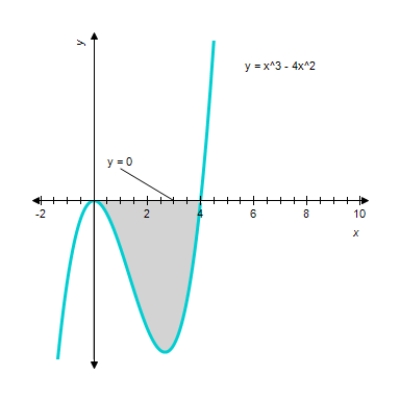
A) A = 21.3 sq units.
B) A = 23.6 sq units.
C) A = 19.9 sq units.
D) A = 18.1 sq units.

A) A = 21.3 sq units.
B) A = 23.6 sq units.
C) A = 19.9 sq units.
D) A = 18.1 sq units.

Unlock Deck
Unlock for access to all 291 flashcards in this deck.
Unlock Deck
k this deck
22
Estimate the present value of an annuity if payments are $800 monthly for 19 years and the account earns interest at the rate of 8% /year compounded continuously. Round your answer to the nearest dollar.
$__________
$__________

Unlock Deck
Unlock for access to all 291 flashcards in this deck.
Unlock Deck
k this deck
23
Verify that  .
.
 .
.
Unlock Deck
Unlock for access to all 291 flashcards in this deck.
Unlock Deck
k this deck
24
In a study conducted by a certain country's Economic Development Board, it was found that the Lorentz curve for the distribution of income of stockbrokers was described by the function

and that of high school teachers by the function

Compute the coefficient of inequality for each Lorentz curve. Round your answers to the nearest hundredth.
The coefficient of inequality for stockbrokers is __________.
The coefficient of inequality for teachers is __________.
Which profession has a more equitable income distribution?

and that of high school teachers by the function

Compute the coefficient of inequality for each Lorentz curve. Round your answers to the nearest hundredth.
The coefficient of inequality for stockbrokers is __________.
The coefficient of inequality for teachers is __________.
Which profession has a more equitable income distribution?

Unlock Deck
Unlock for access to all 291 flashcards in this deck.
Unlock Deck
k this deck
25
Suppose an investment is expected to generate income at the rate of

dollars/year for the next 6 years. Find the present value of this investment if the prevailing interest rate is 0.04% /year compounded continuously. Round your answer to the nearest dollar.
$__________

dollars/year for the next 6 years. Find the present value of this investment if the prevailing interest rate is 0.04% /year compounded continuously. Round your answer to the nearest dollar.
$__________

Unlock Deck
Unlock for access to all 291 flashcards in this deck.
Unlock Deck
k this deck
26
Sinclair wishes to supplement his retirement income by $400 per month for the next 14 years. He plans to obtain a reverse annuity mortgage (RAM) on his home to meet this need. Estimate the amount of the mortgage he will require if the prevailing interest rate is 11% per year compounded continuously. Please round the answer to the nearest dollar.
$__________
$__________

Unlock Deck
Unlock for access to all 291 flashcards in this deck.
Unlock Deck
k this deck
27
Aiso deposits $150 / month in a savings account paying 8% /year compounded continuously. Estimate the amount that will be in his account after 25 years. Round your answer to the nearest dollar.
$__________
$__________

Unlock Deck
Unlock for access to all 291 flashcards in this deck.
Unlock Deck
k this deck
28
It is known that the quantity demanded of a certain make of portable hair dryer is x hundred units/week and the corresponding wholesale unit price is

dollars. Determine the consumers' surplus if the wholesale market price is set at $10/unit. Round your answer to the nearest dollar.
$__________

dollars. Determine the consumers' surplus if the wholesale market price is set at $10/unit. Round your answer to the nearest dollar.
$__________

Unlock Deck
Unlock for access to all 291 flashcards in this deck.
Unlock Deck
k this deck
29
In a study conducted by a certain country's Economic Development Board, it was found that the Lorentz curve for the distribution of income of college teachers was described by the function

and that of lawyers by the function

Compute the coefficient of inequality for each Lorentz curve. Round your answer to four decimal places.
The coefficient of inequality for college teachers is __________.
The coefficient of inequality for lawyers is __________.
Which profession has a more equitable income distribution?

and that of lawyers by the function

Compute the coefficient of inequality for each Lorentz curve. Round your answer to four decimal places.
The coefficient of inequality for college teachers is __________.
The coefficient of inequality for lawyers is __________.
Which profession has a more equitable income distribution?

Unlock Deck
Unlock for access to all 291 flashcards in this deck.
Unlock Deck
k this deck
30
Find the amount of an annuity if $230 per month is paid into it for a period of 20 years, earning interest at the rate of 7% per year compounded continuously. Please round the answer to the nearest dollar.
$__________
$__________

Unlock Deck
Unlock for access to all 291 flashcards in this deck.
Unlock Deck
k this deck
31
The quantity demanded x (in units of a hundred) of the miniature cameras per week is related to the unit price p (in dollars) by

and the quantity x (in units of a hundred) that the supplier is willing to make available in the market is related to the unit price p (in dollars) by

If the market price is set at the equilibrium price, find the consumers' surplus and the producers' surplus. Please round the answers to the nearest dollar.
The consumers' surplus: $__________
The producers' surplus: $__________

and the quantity x (in units of a hundred) that the supplier is willing to make available in the market is related to the unit price p (in dollars) by

If the market price is set at the equilibrium price, find the consumers' surplus and the producers' surplus. Please round the answers to the nearest dollar.
The consumers' surplus: $__________
The producers' surplus: $__________

Unlock Deck
Unlock for access to all 291 flashcards in this deck.
Unlock Deck
k this deck
32
A firm purchased a 10-year franchise for a computer outlet store that is expected to generate income at the rate of

dollars per year. If the prevailing interest rate is 10% per year compounded continuously, find the present value of the franchise. Please round the answer to the nearest dollar.
$__________

dollars per year. If the prevailing interest rate is 10% per year compounded continuously, find the present value of the franchise. Please round the answer to the nearest dollar.
$__________

Unlock Deck
Unlock for access to all 291 flashcards in this deck.
Unlock Deck
k this deck
33
The demand function for a certain brand of compact disc is given by

The supply function for the compact discs is given by

where p is the wholesale unit price in dollars and x is the quantity demanded each week, measured in units of a thousand. Determine the producers' surplus if the wholesale market price is set at the equilibrium price. Round your answer to the nearest dollar.
$__________

The supply function for the compact discs is given by

where p is the wholesale unit price in dollars and x is the quantity demanded each week, measured in units of a thousand. Determine the producers' surplus if the wholesale market price is set at the equilibrium price. Round your answer to the nearest dollar.
$__________

Unlock Deck
Unlock for access to all 291 flashcards in this deck.
Unlock Deck
k this deck
34
The management of the Titan Tire Company has determined that the quantity demanded x of their Super Titan tires/week is related to the unit price p by the relation

where p is measured in dollars and x is measured in units of a thousand. Titan will make x units of the tires available in the market if the unit price is

dollars. Determine the consumers' surplus and the producers' surplus when the market unit price is set at the equilibrium price. Round your answers to the nearest dollars.
CS = $__________
PS = $__________

where p is measured in dollars and x is measured in units of a thousand. Titan will make x units of the tires available in the market if the unit price is

dollars. Determine the consumers' surplus and the producers' surplus when the market unit price is set at the equilibrium price. Round your answers to the nearest dollars.
CS = $__________
PS = $__________

Unlock Deck
Unlock for access to all 291 flashcards in this deck.
Unlock Deck
k this deck
35
A state lottery commission pays the winner of the "Million Dollar" lottery 30 annual installments of $30,000 each. If the prevailing interest rate is 5% /year compounded continuously, find the present value of the winning ticket. Round your answer to the nearest dollar.
$__________
$__________

Unlock Deck
Unlock for access to all 291 flashcards in this deck.
Unlock Deck
k this deck
36
Estimate the present value of an annuity if payments are $1,200 monthly for 11 years and the account earns interest at the rate of 10% per year compounded continuously. Please round the answer to the nearest dollar.
$__________
$__________

Unlock Deck
Unlock for access to all 291 flashcards in this deck.
Unlock Deck
k this deck
37
Find the area of the shaded region. 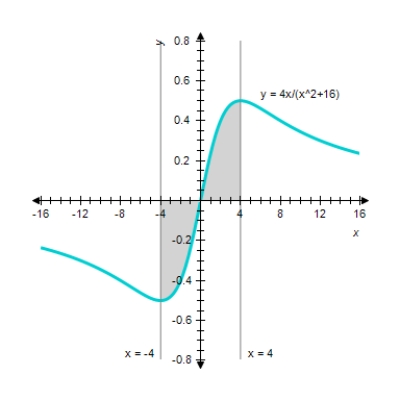
A) A = 4 ln 2 sq units.
B) A = 5 ln 2 sq units.
C) A = 2 ln 2 sq units.
D) A = ln 4 sq units.

A) A = 4 ln 2 sq units.
B) A = 5 ln 2 sq units.
C) A = 2 ln 2 sq units.
D) A = ln 4 sq units.

Unlock Deck
Unlock for access to all 291 flashcards in this deck.
Unlock Deck
k this deck
38
The demand function for a certain brand of compact disc is given by

where p is the wholesale unit price in dollars and x is the quantity demanded each week, measured in units of a thousand. Determine the consumers' surplus if the wholesale market price is set at $3/disc. Round your answer to the nearest dollar.
$__________

where p is the wholesale unit price in dollars and x is the quantity demanded each week, measured in units of a thousand. Determine the consumers' surplus if the wholesale market price is set at $3/disc. Round your answer to the nearest dollar.
$__________

Unlock Deck
Unlock for access to all 291 flashcards in this deck.
Unlock Deck
k this deck
39
The demand function for a certain make of replacement cartridges for a water purifier is given by

where p is the unit price in dollars and x is the quantity demanded each week, measured in units of a thousand. Determine the consumers' surplus if the market price is set at $1/cartridge. Round your answer to the nearest dollar.
CS = $__________

where p is the unit price in dollars and x is the quantity demanded each week, measured in units of a thousand. Determine the consumers' surplus if the market price is set at $1/cartridge. Round your answer to the nearest dollar.
CS = $__________

Unlock Deck
Unlock for access to all 291 flashcards in this deck.
Unlock Deck
k this deck
40
The Armstrongs wish to establish a custodial account to finance their children's education. If they deposit $200 monthly for 10 years in a savings account paying 8% /year compounded continuously, how much will their savings account be worth at the end of this period? Round your answer to the nearest dollar.
$__________
$__________

Unlock Deck
Unlock for access to all 291 flashcards in this deck.
Unlock Deck
k this deck
41
Find the area of the shaded region. 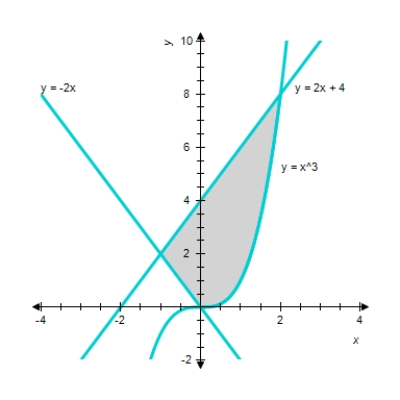
A) A = 12 sq units.
B) A = 13 sq units.
C) A = 9 sq units.
D) A = 10 sq units.

A) A = 12 sq units.
B) A = 13 sq units.
C) A = 9 sq units.
D) A = 10 sq units.

Unlock Deck
Unlock for access to all 291 flashcards in this deck.
Unlock Deck
k this deck
42
Sketch the graphs of the functions f and g and find the area of the region enclosed by these graphs and the vertical lines  and
and  .
. 
A) 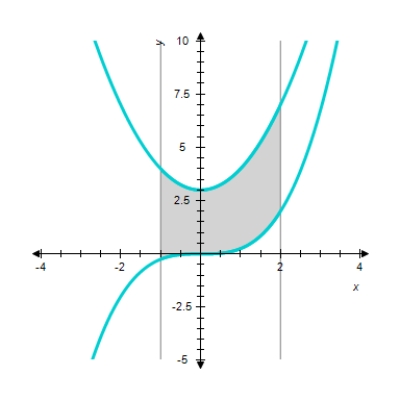
 sq units.
sq units.
B) 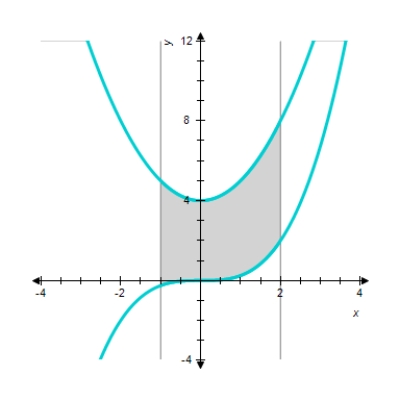
 sq units.
sq units.
C) 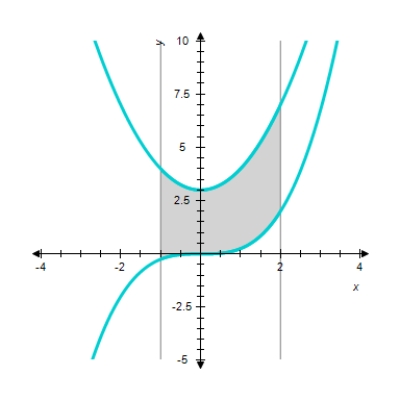
 sq units.
sq units.
D) 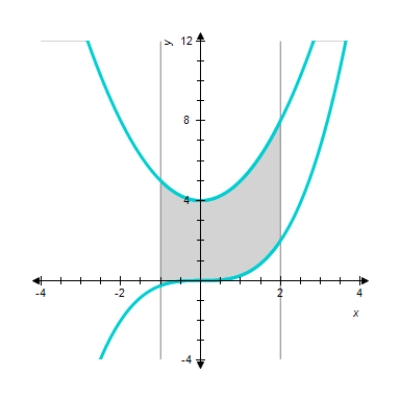
 sq units.
sq units.
 and
and  .
. 
A)

 sq units.
sq units. B)

 sq units.
sq units. C)

 sq units.
sq units. D)

 sq units.
sq units. 
Unlock Deck
Unlock for access to all 291 flashcards in this deck.
Unlock Deck
k this deck
43
Sketch the graph and find the area of the region completely enclosed by the graphs of the given functions f and G.  and
and 
A) 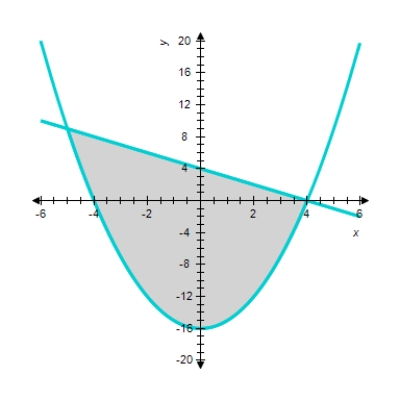
 sq units.
sq units.
B) 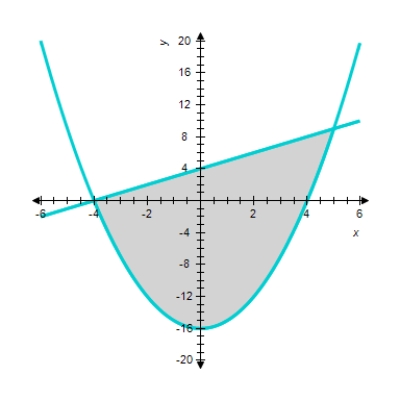
 sq units.
sq units.
C) 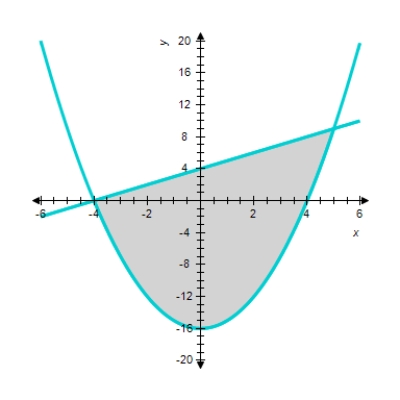
 sq units.
sq units.
D) 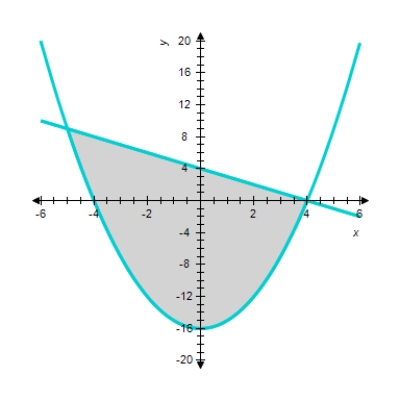
 sq units.
sq units.
 and
and 
A)

 sq units.
sq units. B)

 sq units.
sq units. C)

 sq units.
sq units. D)

 sq units.
sq units. 
Unlock Deck
Unlock for access to all 291 flashcards in this deck.
Unlock Deck
k this deck
44
Sketch the graph and find the area of the region bounded below by the graph of the given function and above by the x-axis from  to
to  .
.

A) 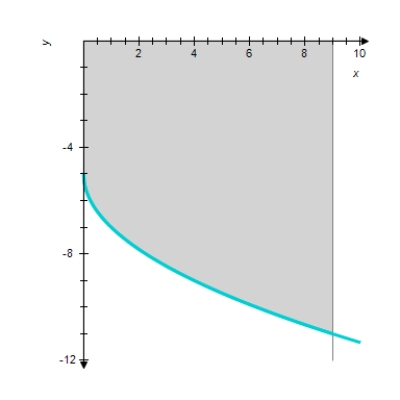
 sq units
sq units
B) 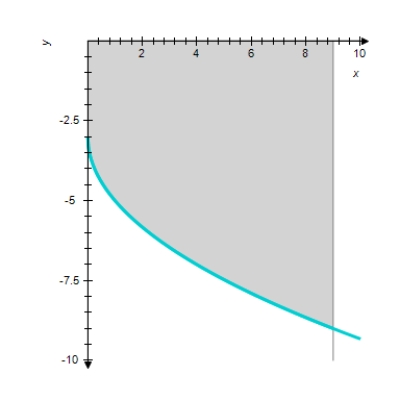
 sq units
sq units
C) 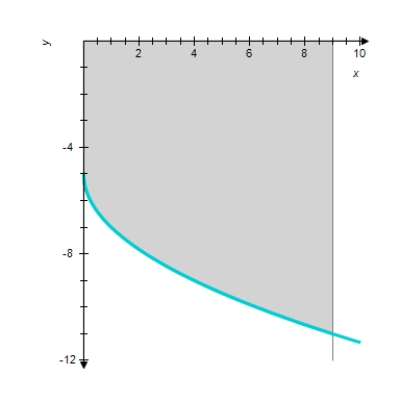
 sq units
sq units
D) 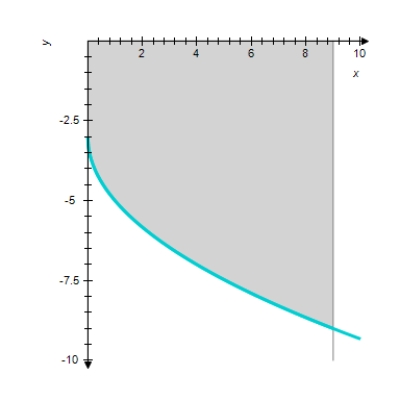
 sq units
sq units
 to
to  .
.

A)

 sq units
sq units B)

 sq units
sq units C)

 sq units
sq units D)

 sq units
sq units 
Unlock Deck
Unlock for access to all 291 flashcards in this deck.
Unlock Deck
k this deck
45
Find the area of the shaded region. 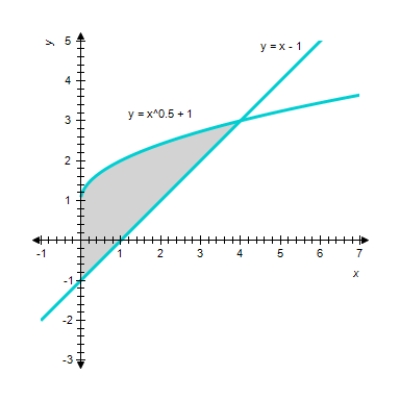
A)
B)
C)
D)
E)

A)

B)

C)

D)

E)


Unlock Deck
Unlock for access to all 291 flashcards in this deck.
Unlock Deck
k this deck
46
Sketch the region completely enclosed by the graphs of the given functions f and G.  and
and 
A) 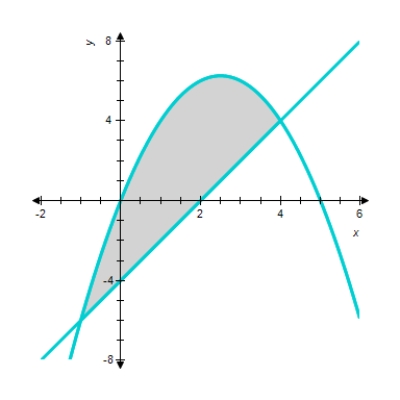
 sq units.
sq units.
B) 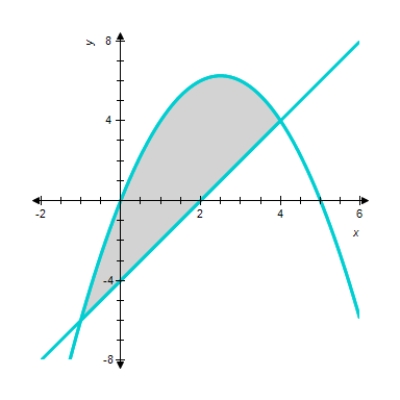
 sq units.
sq units.
C) 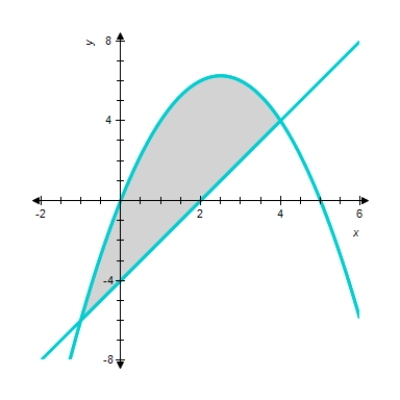
 sq units.
sq units.
D) 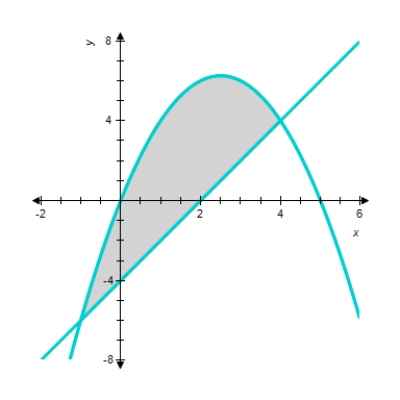
 sq units.
sq units.
 and
and 
A)

 sq units.
sq units. B)

 sq units.
sq units. C)

 sq units.
sq units. D)

 sq units.
sq units. 
Unlock Deck
Unlock for access to all 291 flashcards in this deck.
Unlock Deck
k this deck
47
Sketch the graphs of the functions f and g and find the area of the region enclosed by these graphs and the vertical lines  and
and  .
. 
A) 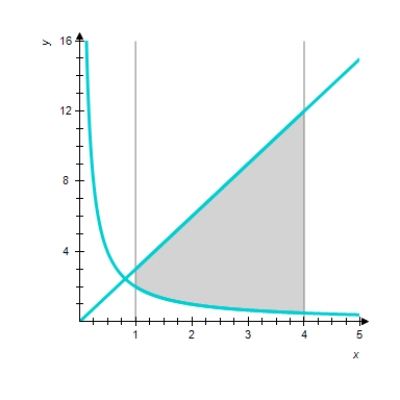
 sq units.
sq units.
B) 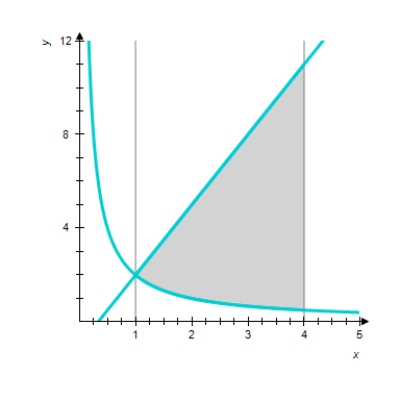
 sq units.
sq units.
C) 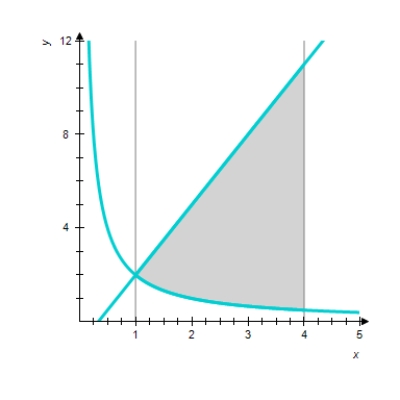
 sq units.
sq units.
D) 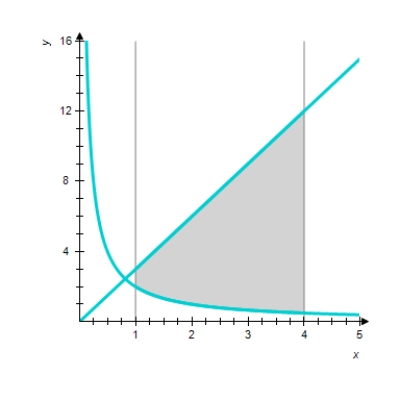
 sq units.
sq units.
 and
and  .
. 
A)

 sq units.
sq units. B)

 sq units.
sq units. C)

 sq units.
sq units. D)

 sq units.
sq units. 
Unlock Deck
Unlock for access to all 291 flashcards in this deck.
Unlock Deck
k this deck
48
Sketch the graphs of the functions f and g and find the area of the region enclosed by these graphs and the vertical lines  and
and  .
. 
A) 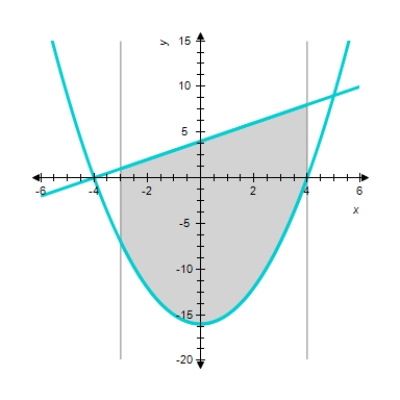
 sq units.
sq units.
B) 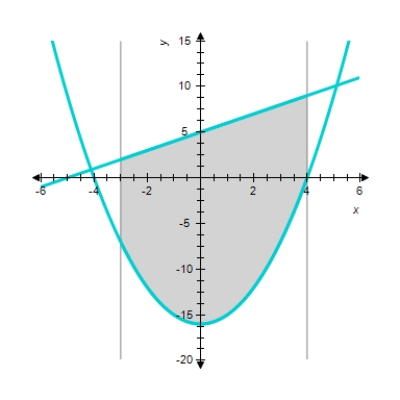
 sq units.
sq units.
C) 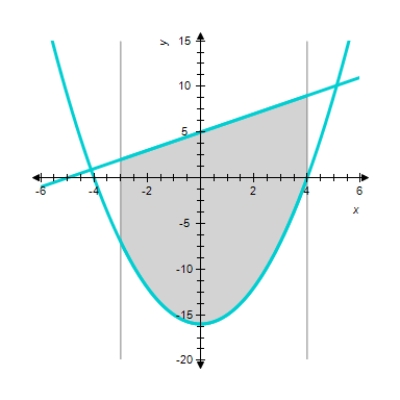
 sq units.
sq units.
D) 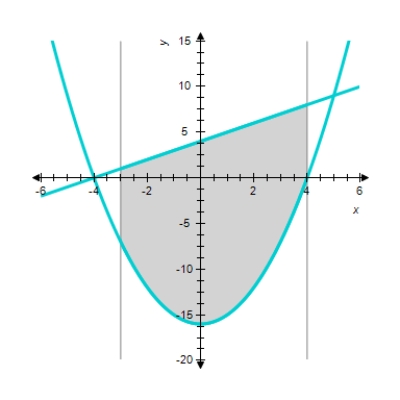
 sq units.
sq units.
 and
and  .
. 
A)

 sq units.
sq units. B)

 sq units.
sq units. C)

 sq units.
sq units. D)

 sq units.
sq units. 
Unlock Deck
Unlock for access to all 291 flashcards in this deck.
Unlock Deck
k this deck
49
Sketch the region completely enclosed by the graphs of the given functions f and G.  and
and 
A) 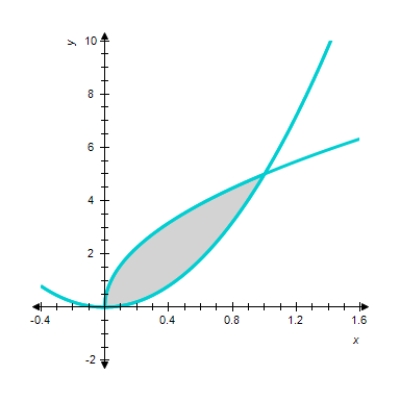
 sq units.
sq units.
B) 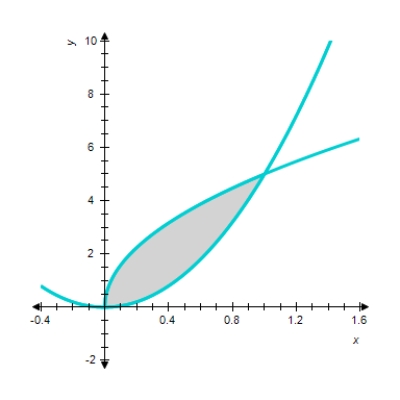
 sq units.
sq units.
C) 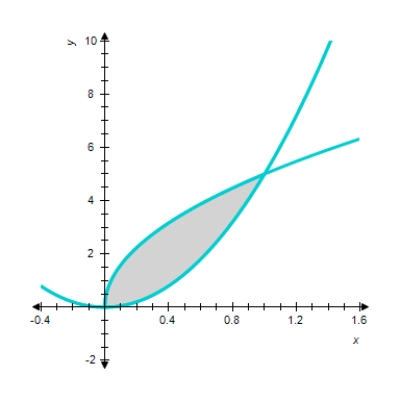
 sq units.
sq units.
D) 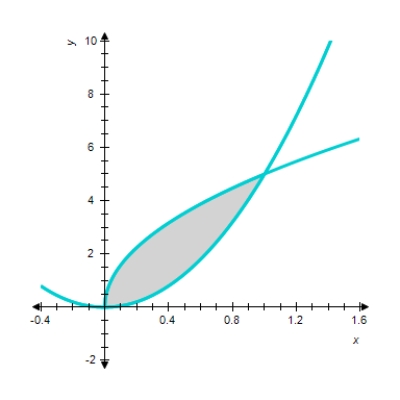
 sq units.
sq units.
 and
and 
A)

 sq units.
sq units. B)

 sq units.
sq units. C)

 sq units.
sq units. D)

 sq units.
sq units. 
Unlock Deck
Unlock for access to all 291 flashcards in this deck.
Unlock Deck
k this deck
50
In an endeavor to curb population growth in a certain country, the government has decided to launch an extensive propaganda campaign. Without curbs, the government expects the rate of population growth to have been 
Thousand people per year t years from now, over the next 5 years. However, successful implementation of the proposed campaign is expected to result in a population growth rate of

Thousand people per year t years from now, over the next 5 years. Assuming that the campaign is mounted, how many fewer people will there be in that country 5 years from now then there would have been if no curbs had been imposed?
Please round your answer to the nearest integer number of thousands.
A) 43 thousand people
B) 42 thousand people
C) 47 thousand people
D) 56 thousand people
E) 53 thousand people

Thousand people per year t years from now, over the next 5 years. However, successful implementation of the proposed campaign is expected to result in a population growth rate of

Thousand people per year t years from now, over the next 5 years. Assuming that the campaign is mounted, how many fewer people will there be in that country 5 years from now then there would have been if no curbs had been imposed?
Please round your answer to the nearest integer number of thousands.
A) 43 thousand people
B) 42 thousand people
C) 47 thousand people
D) 56 thousand people
E) 53 thousand people

Unlock Deck
Unlock for access to all 291 flashcards in this deck.
Unlock Deck
k this deck
51
Find the area of the region enclosed by these graphs and the vertical lines  and
and  .
. 
A)
B) 
C) 
D) 
E) 
 and
and  .
. 
A)

B)

C)

D)

E)


Unlock Deck
Unlock for access to all 291 flashcards in this deck.
Unlock Deck
k this deck
52
Sketch the graph and find the area of the region bounded below by the graph of the given function and above by the x-axis from  to
to  .
. 
A) 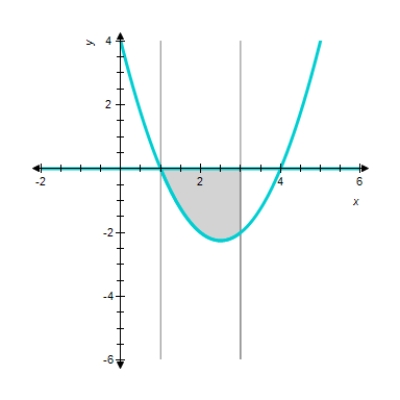
 sq units.
sq units.
B) 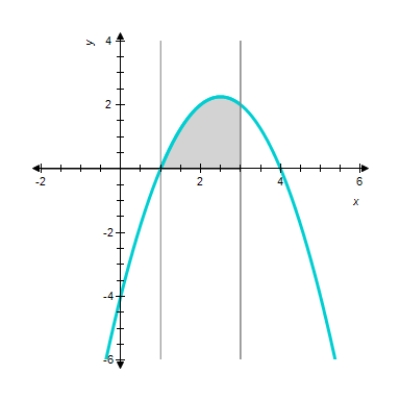
 sq units.
sq units.
C) 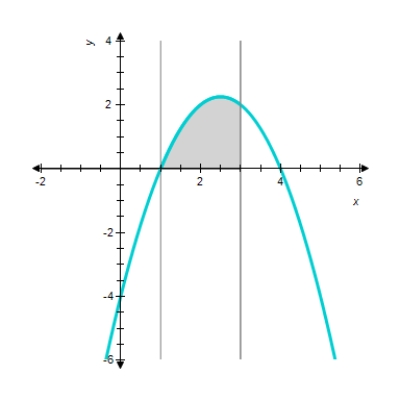
 sq units.
sq units.
D) 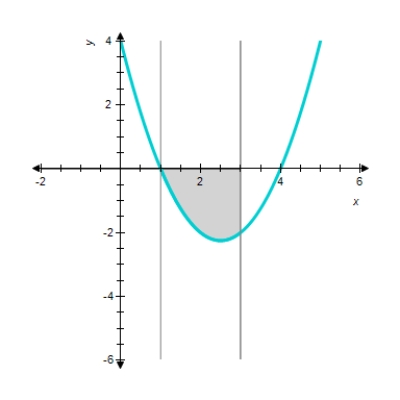
 sq units.
sq units.
 to
to  .
. 
A)

 sq units.
sq units. B)

 sq units.
sq units. C)

 sq units.
sq units. D)

 sq units.
sq units. 
Unlock Deck
Unlock for access to all 291 flashcards in this deck.
Unlock Deck
k this deck
53
Sketch the graph and find the area of the region bounded by the graph of the function f and lines  ,
,  and
and  .
. 
A) 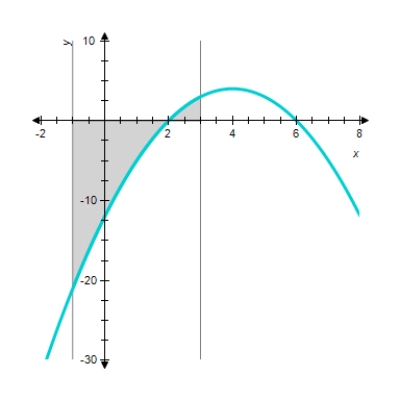
 sq units.
sq units.
B) 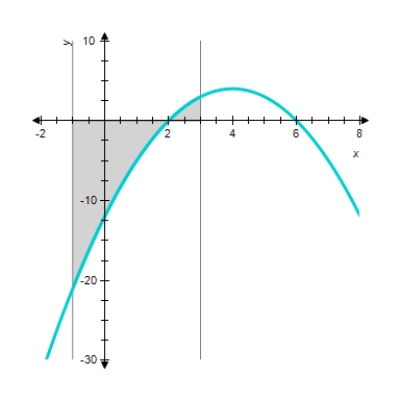
 sq units.
sq units.
C) 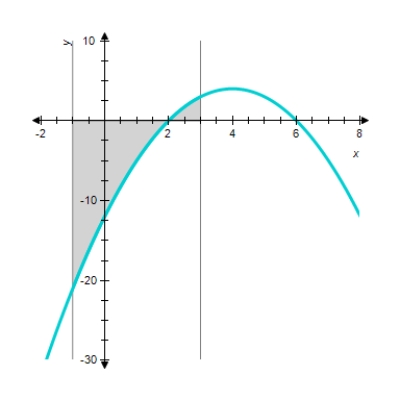
 sq units.
sq units.
D) 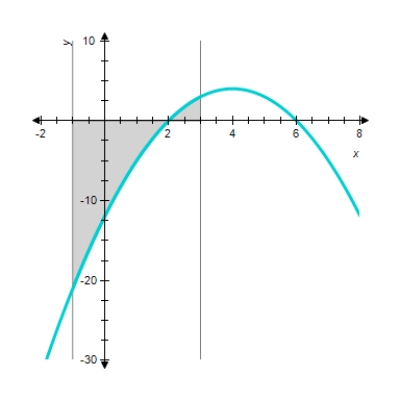
 sq units.
sq units.
 ,
,  and
and  .
. 
A)

 sq units.
sq units. B)

 sq units.
sq units. C)

 sq units.
sq units. D)

 sq units.
sq units. 
Unlock Deck
Unlock for access to all 291 flashcards in this deck.
Unlock Deck
k this deck
54
Sketch the graph and find the area of the region bounded by the graph of the function f and lines  ,
,  and
and  .
. 
A) 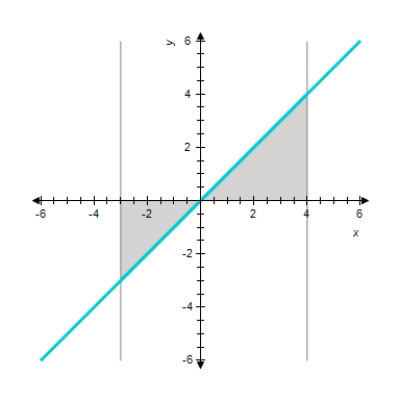
 sq units.
sq units.
B) 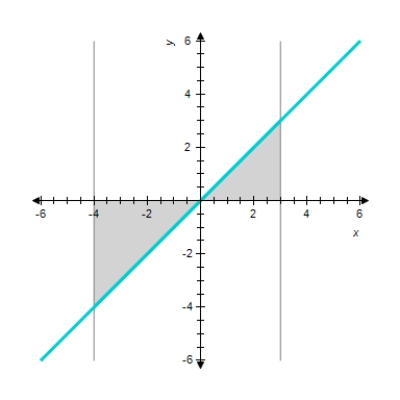
 sq units.
sq units.
C) 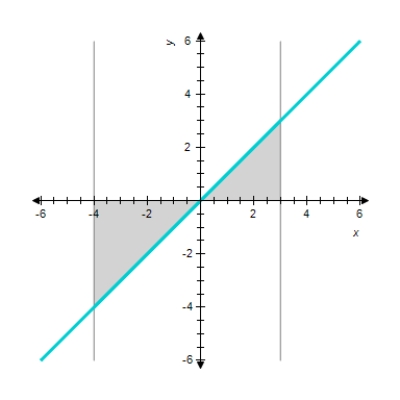
 sq units.
sq units.
D) 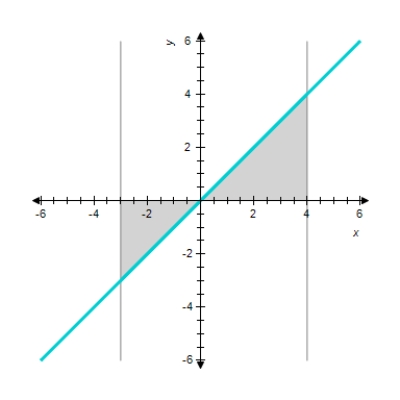
 sq units.
sq units.
 ,
,  and
and  .
. 
A)

 sq units.
sq units. B)

 sq units.
sq units. C)

 sq units.
sq units. D)

 sq units.
sq units. 
Unlock Deck
Unlock for access to all 291 flashcards in this deck.
Unlock Deck
k this deck
55
In tests conducted by Auto Test Magazine on two identical models of the Phoenix Elite - one equipped with a standard engine and the other with a turbo-charger - it was found that the acceleration of the former is given by 
Ft/sec, t sec after starting from rest at full throttle, whereas the acceleration of the latter is given by

Ft/sec. How much faster is the turbo-charged model moving than the model with the standard engine at the end of a 10-second test run at full throttle?
A) 60 ft/sec
B) 67 ft/sec
C) 65 ft/sec
D) 50 ft/sec

Ft/sec, t sec after starting from rest at full throttle, whereas the acceleration of the latter is given by

Ft/sec. How much faster is the turbo-charged model moving than the model with the standard engine at the end of a 10-second test run at full throttle?
A) 60 ft/sec
B) 67 ft/sec
C) 65 ft/sec
D) 50 ft/sec

Unlock Deck
Unlock for access to all 291 flashcards in this deck.
Unlock Deck
k this deck
56
Find the area of the region bounded below by the graph of the function and above by the x-axis from  to
to  .
. 
A)
B) 
C) 
D) 
E) 
 to
to  .
. 
A)

B)

C)

D)

E)


Unlock Deck
Unlock for access to all 291 flashcards in this deck.
Unlock Deck
k this deck
57
Sketch the graph and find the area of the region bounded by the graph of the function f and lines  ,
,  and
and  .
. 
A) 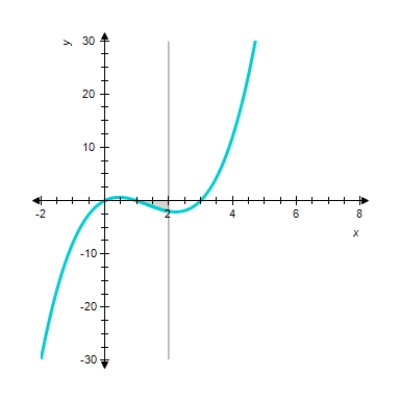
 sq units.
sq units.
B) 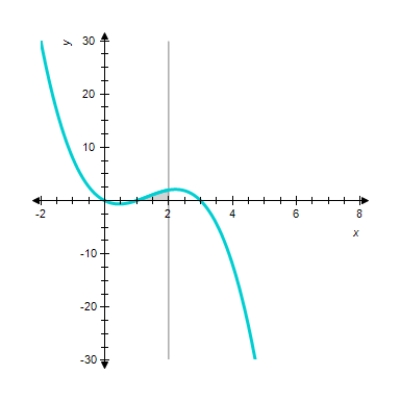
 sq units.
sq units.
C) 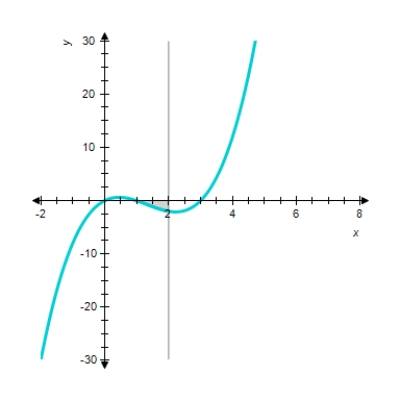
 sq units.
sq units.
D) 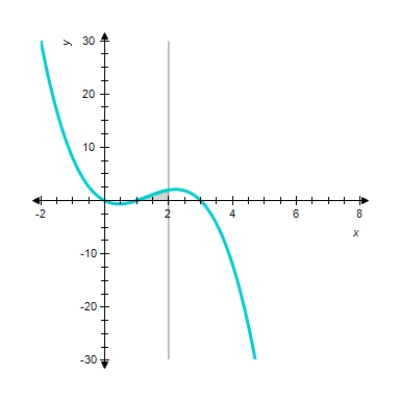
 sq units.
sq units.
 ,
,  and
and  .
. 
A)

 sq units.
sq units. B)

 sq units.
sq units. C)

 sq units.
sq units. D)

 sq units.
sq units. 
Unlock Deck
Unlock for access to all 291 flashcards in this deck.
Unlock Deck
k this deck
58
Because of the increasingly important role played by coal as a viable alternative energy source, the production of coal has been growing at the rate of 
Billion metric tons/year t years from 1970 (which corresponds to ). Had it not been for the energy crisis, the rate of production of coal since 1970 might have been only
). Had it not been for the energy crisis, the rate of production of coal since 1970 might have been only

Billion metric tons/year t years from 1970. Determine how much additional coal was produced between 1970 and the end of the century as an alternate energy source. Round your answer to one decimal place.
A) 121.3 billion metric tons
B) 128.6 billion metric tons
C) 127.0 billion metric tons
D) 118.1 billion metric tons

Billion metric tons/year t years from 1970 (which corresponds to
 ). Had it not been for the energy crisis, the rate of production of coal since 1970 might have been only
). Had it not been for the energy crisis, the rate of production of coal since 1970 might have been only

Billion metric tons/year t years from 1970. Determine how much additional coal was produced between 1970 and the end of the century as an alternate energy source. Round your answer to one decimal place.
A) 121.3 billion metric tons
B) 128.6 billion metric tons
C) 127.0 billion metric tons
D) 118.1 billion metric tons

Unlock Deck
Unlock for access to all 291 flashcards in this deck.
Unlock Deck
k this deck
59
Find the area of the region bounded by the graph of the function f and the lines  ,
,  , and
, and  .
. 
A)
B) 
C) 
D) 
E) 
 ,
,  , and
, and  .
. 
A)

B)

C)

D)

E)


Unlock Deck
Unlock for access to all 291 flashcards in this deck.
Unlock Deck
k this deck
60
Sketch the graphs of the functions f and g and find the area of the region enclosed by these graphs and the vertical lines  and
and  .
. 
A) 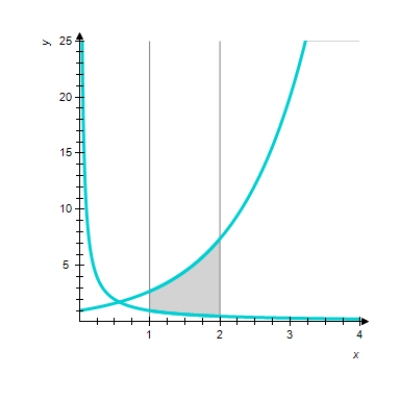
 sq units.
sq units.
B) 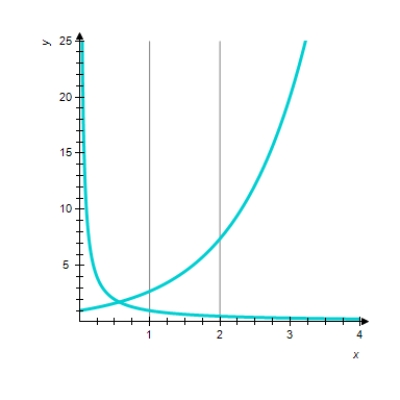
 sq units.
sq units.
C) 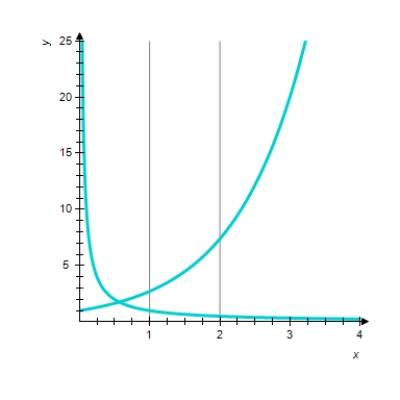
 sq units.
sq units.
D) 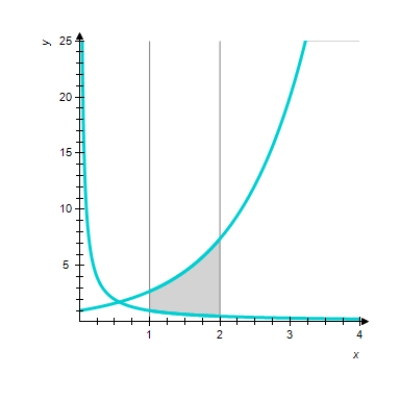
 sq units.
sq units.
 and
and  .
. 
A)

 sq units.
sq units. B)

 sq units.
sq units. C)

 sq units.
sq units. D)

 sq units.
sq units. 
Unlock Deck
Unlock for access to all 291 flashcards in this deck.
Unlock Deck
k this deck
61
Find the area of the shaded region. Round your answer to one decimal place.
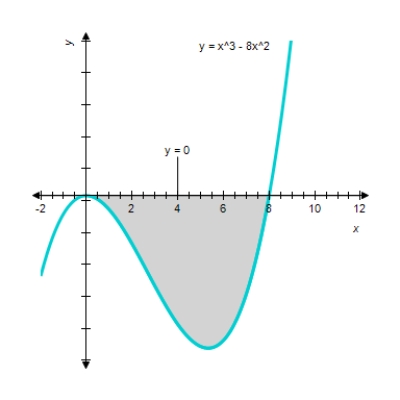


Unlock Deck
Unlock for access to all 291 flashcards in this deck.
Unlock Deck
k this deck
62
Find the area of the shaded region.
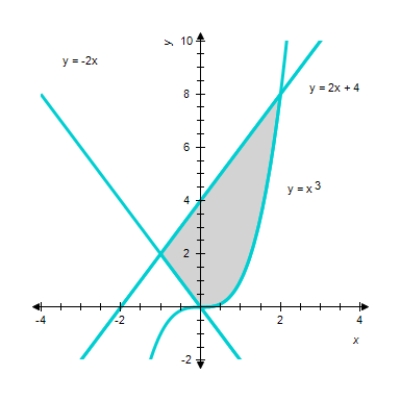


Unlock Deck
Unlock for access to all 291 flashcards in this deck.
Unlock Deck
k this deck
63
Determine whether the statement is true or false. If it is true, explain why it is true. If it is false, give an example to show why it is false.
The area of the region bounded by the graphs of and
and  and the vertical lines
and the vertical lines  and
and  is given by
is given by  .
.
The area of the region bounded by the graphs of
 and
and  and the vertical lines
and the vertical lines  and
and  is given by
is given by  .
.
Unlock Deck
Unlock for access to all 291 flashcards in this deck.
Unlock Deck
k this deck
64
In tests conducted by Auto Test Magazine on two identical models of the Phoenix Elite - one equipped with a standard engine and the other with a turbo-charger - it was found that the acceleration of the former is given by

ft/sec, t seconds after starting from rest at full throttle, whereas the acceleration of the latter is given by

ft/sec. How much faster is the turbo-charged model moving than the model with the standard engine at the end of a 10-second test run at full throttle?
__________ ft/sec

ft/sec, t seconds after starting from rest at full throttle, whereas the acceleration of the latter is given by

ft/sec. How much faster is the turbo-charged model moving than the model with the standard engine at the end of a 10-second test run at full throttle?
__________ ft/sec

Unlock Deck
Unlock for access to all 291 flashcards in this deck.
Unlock Deck
k this deck
65
In an endeavor to curb population growth in a certain country, the government has decided to launch an extensive propaganda campaign. Without curbs, the government expects the rate of population growth to have been

thousand people per year t years from now, over the next 5 years. However, successful implementation of the proposed campaign is expected to result in a population growth rate of

thousand people per year t years from now, over the next 5 years. Assuming that the campaign is mounted, how many fewer people will there be in that country 5 years from now then there would have been if no curbs had been imposed?
Please round your answer to the nearest whole number.
__________ thousand people

thousand people per year t years from now, over the next 5 years. However, successful implementation of the proposed campaign is expected to result in a population growth rate of

thousand people per year t years from now, over the next 5 years. Assuming that the campaign is mounted, how many fewer people will there be in that country 5 years from now then there would have been if no curbs had been imposed?
Please round your answer to the nearest whole number.
__________ thousand people

Unlock Deck
Unlock for access to all 291 flashcards in this deck.
Unlock Deck
k this deck
66
Find the area of the shaded region.
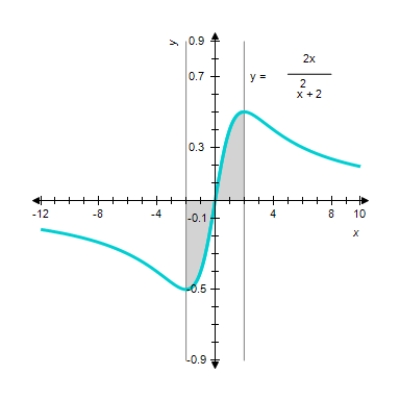


Unlock Deck
Unlock for access to all 291 flashcards in this deck.
Unlock Deck
k this deck
67
Because of the increasingly important role played by coal as a viable alternative energy source, the production of coal has been growing at the rate of

billion metric tons/year t years from 1960 (which corresponds to ). Had it not been for the energy crisis, the rate of production of coal since 1960 might have been only
). Had it not been for the energy crisis, the rate of production of coal since 1960 might have been only

billion metric tons/year t years from 1960. Determine how much additional coal was produced between 1960 and the end of the century as an alternate energy source. Round your answer to one decimal place.
__________ billion metric tons

billion metric tons/year t years from 1960 (which corresponds to
 ). Had it not been for the energy crisis, the rate of production of coal since 1960 might have been only
). Had it not been for the energy crisis, the rate of production of coal since 1960 might have been only

billion metric tons/year t years from 1960. Determine how much additional coal was produced between 1960 and the end of the century as an alternate energy source. Round your answer to one decimal place.
__________ billion metric tons

Unlock Deck
Unlock for access to all 291 flashcards in this deck.
Unlock Deck
k this deck
68
Evaluate the given definite integral. 
A)
B)
C)
D)

A)

B)

C)

D)


Unlock Deck
Unlock for access to all 291 flashcards in this deck.
Unlock Deck
k this deck
69
Evaluate the given definite integral. 
A)
B)
C)
D)

A)

B)

C)

D)


Unlock Deck
Unlock for access to all 291 flashcards in this deck.
Unlock Deck
k this deck
70
Evaluate the given definite integral. 
A)
B)
C)
D)

A)

B)

C)

D)


Unlock Deck
Unlock for access to all 291 flashcards in this deck.
Unlock Deck
k this deck
71
Determine whether the statement is true or false. If it is true, explain why it is true. If it is false, give an example to show why it is false.
The area of the region bounded by the graphs of and
and  and the vertical lines
and the vertical lines  and
and  is given by
is given by  .
.
The area of the region bounded by the graphs of
 and
and  and the vertical lines
and the vertical lines  and
and  is given by
is given by  .
.

Unlock Deck
Unlock for access to all 291 flashcards in this deck.
Unlock Deck
k this deck
72
Evaluate the definite integral. 
A)
B)
C)
D)
E)

A)

B)

C)

D)

E)


Unlock Deck
Unlock for access to all 291 flashcards in this deck.
Unlock Deck
k this deck
73
Evaluate the given definite integral. 
A)
B)
C)
D)

A)

B)

C)

D)


Unlock Deck
Unlock for access to all 291 flashcards in this deck.
Unlock Deck
k this deck
74
Evaluate the given definite integral. 
A)
B)
C)
D)

A)

B)

C)

D)


Unlock Deck
Unlock for access to all 291 flashcards in this deck.
Unlock Deck
k this deck
75
Find the area of the shaded region.
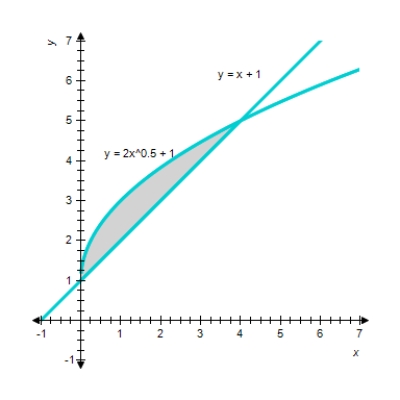


Unlock Deck
Unlock for access to all 291 flashcards in this deck.
Unlock Deck
k this deck
76
Evaluate the definite integral. 
A)
B)
C)
D)
E)

A)

B)

C)

D)

E)


Unlock Deck
Unlock for access to all 291 flashcards in this deck.
Unlock Deck
k this deck
77
Evaluate the given definite integral. 
A)
B)
C)
D)

A)

B)

C)

D)


Unlock Deck
Unlock for access to all 291 flashcards in this deck.
Unlock Deck
k this deck
78
Evaluate the definite integral. 
A)
B)
C)
D)
E)

A)

B)

C)

D)

E)


Unlock Deck
Unlock for access to all 291 flashcards in this deck.
Unlock Deck
k this deck
79
Evaluate the given definite integral. 
A)
B)
C)
D)

A)

B)

C)

D)


Unlock Deck
Unlock for access to all 291 flashcards in this deck.
Unlock Deck
k this deck
80
Evaluate the given definite integral. 
A)
B)
C)
D)

A)

B)

C)

D)


Unlock Deck
Unlock for access to all 291 flashcards in this deck.
Unlock Deck
k this deck


